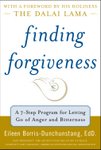Immaculee Ilibagiza, a Rwandan woman who wrote Left to Tell (Hay House, 2006) was able to forgive the unthinkable. For 91 days of the 1994 genocide in Rwanda she hid in a tiny bathroom with seven other women in the home of her local pastor. She describes the horror she lived through and the stunning transformation she experienced because of her desire to forgive. Something happened within her where she was able to move her consciousness to deeper levels of understanding and experience inexplicable love. When the genocide ended, Immaculee met one of her family’s murderers and was able to forgive him.
How is forgiveness possible in the face of such horrific acts and what exactly is forgiveness? In the most simplistic of terms forgiveness is a willingness to let go of resentment and to stop suffering. I define forgiveness as a voluntary act in which you make a decision to see a situation differently. Instead of seeing a situation through the lens of anger, guilt or fear we see it through the eyes of compassion and understanding. I like to think of forgiveness as the science of the heart, a discipline of discovering all the ways of being that will extend your love to the world and discarding all the ways that do not. On a deeper level forgiveness is about changing the way we think which includes embracing our humanity and spiritual nature and the humanity and spiritual nature of all human beings.
In the Handbook of Forgiveness (Routledge, 2005) an anthology of scientific studies edited by Everett Worthington Jr. experts in the field expose gradations in definitions of forgiveness. In spite of this they all do agree on one thing. Unforgiveness is a state of anger, bitterness and in its extreme form hatred. Forgiveness is a prosocial change in someone’s experience after a transgression. When people choose to forgive, they change.
My question to you is, has there been something in your life in which you were able to forgive and if so, how were you changed?
Sunday, January 3, 2010
Subscribe to:
Post Comments (Atom)



6 comments:
There are two people in my life with whom I may still have forgiveness issues--stemming from my need for them to understand how they hurt me. I have had to work hard to let that go. One of those people is my mother, the other is my ex. I understand why they did to me what they did, for the most part. I understand it wasn't about me; it was their stuff they were responding to--I was merely a target. I get that. And I do have compassion for them; I would not want them to experience what I did, and I wish them well. I have even grown as a person because of what they did to me and how I responded. But I do not care, for example, to be friends with my ex. My only contact with him, if ever, involves our kids. I can do that, for them, if necessary. But I do not like him as person. And I chose a long time ago not to have any kind of relationship with my mother. I simply don't trust her love. Occasionally, something comes up to cause me to question my stand, and I have to review it with a therapist. But the result is always the same. I trust my gut on this one. I have chosen to take care of myself first, because I wasn't able to do that as a child. For me, it's been a long process, and I accept that my attitude might change. I am open to the possibility. But my main concern is to be true to who I am. And right now, I am the person who chooses not to be in a relationship with these two people. I'm not sure there's anything any more to forgive.
Jackie, I am really touched by your story which is a very important one. You also bring up a very important issue. Forgiving someone doesn't mean that you have to be their friend or be in a relationship with them. Forgiveness is about your inner healing which helps you let go of the painful past and be at peace.
A powerful post and response to Jackie's comment, Eileen. I do believe forgiveness frees inner space, and I thought I had mastered its art long ago. I am, by nature, forgiving. And then...I realized there was a man in my life who I desperately needed to forgive. My father-in-law, who never parented me (obviously) and who has been dead for 15 years. But anytime I see the results of bad parenting on his part as they creep into my relationship with his son, I would let old anger slip in. Often, I held him accountable for situations that were well within my own parameters of cause and effect.
Forgiving him not only helped me see my relationships with my husband and sons (because I had given my father-in-law's influence a lot of generational power!) in their present and true context, but it also allowed me to remember many of the exceptionally good things about my father-in-law that were manifested in my own relationship with him.
Forgiveness is so incredibly powerful. Thank you for taking us on this journey!
Mimi, that's what I love about forgiveness. When we do our inner work we begin to recognize that what we reflect out on to others is really a reflection of what is inside of ourselves. As we peel off our defensive layers we get closer to our true self which is ultimately love.
Eileen, your last statement strikes me as most important. I will meditate on that.
Bike Lady, the process of forgiveness reminds me of the story of the prodigal son who left his fathers home only to return. We too leave our home as our ego self takes us on a pretty wild journey only for us to realize that the material world is not all it is cracked up to be. We begin to search for something else and begin to recognize that there is something far more powerful that we may not readily see or touch. It is the same with forgiveness. We get hurt and angry and think that the only way to deal with this is to get back, hold on to the past, hold on to our pain, etc. Then we realize that perhaps there is a better way to handling this and webegin to see the world with different eyes. Those eyes help us grow in love and it is love that becomes the great healer.
Post a Comment